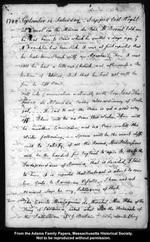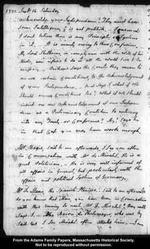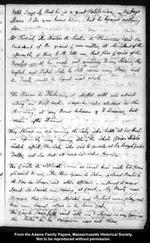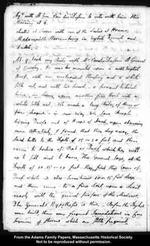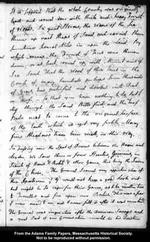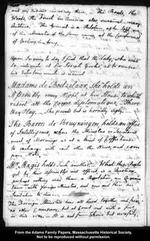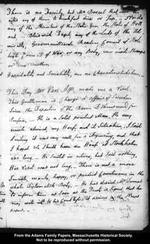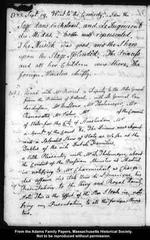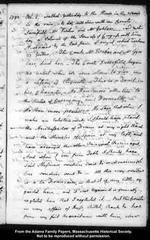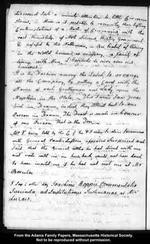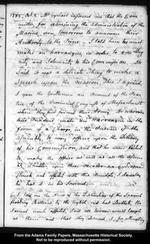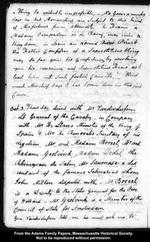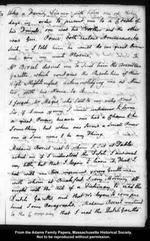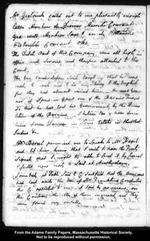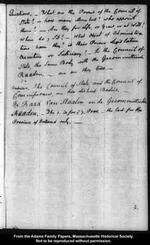1782 SEPTEMBER 14 SATURDAY.
Supped last Night at Court in the Maison du Bois. M. Boreel told me he had been to Paris which he quitted 8 days ago. That M. Franklin had been sick. It was at first reported that he had been struck with an Apoplexity. Then it was said he had a billious Cholick, and afterwards a Retention of Urine. But that he had got well before he left Paris.
Fell into Conversation naturally with Don Joas Theolonico de Almeida, Envoy Extraordinary of Portugal. . . . He said to me, the Peace is yet a good Way off. There will be no Peace this Winter. There will be another Campain, and no Peace untill the Winter following . . . Spain will be the most difficult to satisfy, of all the Powers. Her Pretensions will be the hardest for England to agree to. As to the Independance of America, that is decided. I said to him, it is reported that Portugal is about to open her Ports to American Vessells. -- I have not yet received says he any Intelligence of that.
The Comte Montagnini de Mirabel, Min. Plen. of the King of Sardinia, asked what was the Principle of the Indecision of G. Britain? Why dont they
acknowledge your Independance? They must have some Intelligence, that is not publick. -- I answered I dont believe there is any Principle, or System in it. It is merely owing to their Confusion. My Lord Shelburne, in complyance with the Will of his Master, refuses to do what all the World sees to be necessary. -- Perhaps says the Comte they mean to annex certain Conditions, to the Acknowledgment of your Independance. -- But says I, what if We should annex Conditions too? What if We should insist on an Acknowledgement of our Independence as a Preliminary Condition to entering into any Treaty or Conference? -- Ay, says he, in that Case you may have work enough.
acknowledge your Independance? They must have some Intelligence, that is not publick. -- I answered I dont believe there is any Principle, or System in it. It is merely owing to their Confusion. My Lord Shelburne, in complyance with the Will of his Master, refuses to do what all the World sees to be necessary. -- Perhaps says the Comte they mean to annex certain Conditions, to the Acknowledgment of your Independance. -- But says I, what if We should annex Conditions too? What if We should insist on an Acknowledgement of our Independence as a Preliminary Condition to entering into any Treaty or Conference? -- Ay, says he, in that Case you may have work enough.
Mr. Magis said to me afterwards, I see you often in Conversation with Mr. de Mirabel. He is a great Politician. He is very well informed of all affairs in General, but particularly with the Affairs and political System of Germany.
Mr. De Llano, the Spanish Plenipo., said to me afterwards, do you know that Man, you have been in Conversation with this Evening so much, Mr. De Mirabel? -- Very well says I. -- The Baron de Thulemeyer, who was by, said Yes I see Mirabel often Attacks him. -- I am
told says I, that he is a great Politician. -- Ay says Llano I see you know him -- but he knows nothing else.
told says I, that he is a great Politician. -- Ay says Llano I see you know him -- but he knows nothing else.
Mr. Boreel, The Baron de Linden de Hemmen, and the President of the grand Committee, all Members of the Assembly of their H. M. [High Mightinesses], told me, that five Copies of the Treaties would be made out, according to my Desire, the English and Dutch Side by Side upon every Page, and the Treaty would be signed next Week.
The Baron de Thulemeyer chatted with me about riding on Horseback. Says he rides always in the Morning, at any Hour between 9 and Dinner, but never after Dinner.
They shewed me this Evening the Lady who holds at her House an Assembly every Evening, where the whole Corps Diplomatick assists. The Lady, who used to preside at Sir Joseph Yorks Table, and see that all was in order there.
The Comte de Welderen came as usual and made his Compliment to me. -- The Rhin Grave de Salm, Colonel Bentink, M. Van der Duesn, and other officers. In short I never spent so social an Evening at Court. Party was stronger this Evening, Mirabel and Bentink never play, and there were several others in the same Case.
The Comte Sarsefield went with me and returned in my Carriage. The Duke de la Vauguion was not there.
Ag. [Agreed] with Lt. Gen. Van der Dussen to ride with him this Morning at 9.
Chatted at Supper with one of the Ladies of Honour, Madamoiselle Starembourg, in English, French and Dutch.
At 9 took my Ride with Mr. Vander Dussen Lt. General of Cavalry. He was mounted upon a noble English Horse, with an embroidered Housing and a white silk net, and with his sword. A servant behind him in Livery, upon another fine Horse with a white silk net. We made a long Ride, of three of four Leagues. In our Way We saw People digging Turfs out of Heaps of Sand. Upon observing more Attentively, I found that they dug away the sand hills to the Depth of 15 or 20 feet, and then came to bodies of Peat or Turf, which they cutt up to sell and to burn. The General says, at the Depth of 10, 15 or 20 feet, they find this layer of Turf which is also some times 10 or 15 feet deep and then come to a fine Soil, upon a Level nearly with the general surface of the Meadows. The Generals Hypothesis is this. -- Before the Dykes were built, there were frequent Inundations in Consequence of storms which are still frequent.
It is supposed that the whole Country was originally level and covered over with thick and heavy Forrests of Woods. In great Storms, the Waves of the Sea threw up vast Heaps of Sand, and carried them sometimes several Miles in upon the Land. By which means the Forrests of Trees were thrown down, or at least covered up, with Mountains of Sea Sand. That the Wood of these Trees in the Course of many hundreds perhaps some thousands of Years, has putrified and dissolved into Peat or Turfe. So that you have nothing to do, but to dig through the Sand Hills first, and the Turf Beds next to come to the original Surface of the Earth which is yet very fertile. Many fine Meadows have been made, in this Way.
It is supposed that the whole Country was originally level and covered over with thick and heavy Forrests of Woods. In great Storms, the Waves of the Sea threw up vast Heaps of Sand, and carried them sometimes several Miles in upon the Land. By which means the Forrests of Trees were thrown down, or at least covered up, with Mountains of Sea Sand. That the Wood of these Trees in the Course of many hundreds perhaps some thousands of Years, has putrified and dissolved into Peat or Turfe. So that you have nothing to do, but to dig through the Sand Hills first, and the Turf Beds next to come to the original Surface of the Earth which is yet very fertile. Many fine Meadows have been made, in this Way.
In passing over the Spot of Downs between the Hague and Leyden, We saw three or four Hunters, Gunners, in search of Hares and Rabits and other Game, this being the Season of the Chase. The General seemed very apprehensive of these Sportsmen that they would not keep a good Look out but might be so eager for their Game, as to be inattentive to Travellers and fire upon our Bodies. This was a fear that never occurred to me, and I never felt it after it was mentioned.
The General was inquisitive after the American Savages and a great Part of our Conversation consisted in his Questions
and my Answers concerning them. The Roads, the Woods, the Forests in America also, occasioned many Questions. -- The General is a Relation as he told me, of the Minister of the same name at the Conferences of Gertruydenbourg.
and my Answers concerning them. The Roads, the Woods, the Forests in America also, occasioned many Questions. -- The General is a Relation as he told me, of the Minister of the same name at the Conferences of Gertruydenbourg.
Upon Inquiry to day I find that the Lady, who was so intimate at Sir Joseph Yorks, as to oversee his Entertainments, is named Madame de Boetzelaar. She holds an Assembly every Night, at her House, to which resort all the Corps diplomatique. There they Play. She paints but is horridly ugly.
The Baron de Kruyningen holds an Office of Intelligence, where the Ministers or Secretaries meet of Mornings as at a Kind of Coffee house to exchange with each other the News, and compare Notes.
Mr. Magis holds such another. What these People get by their Assemblys and Offices, is a Question. Perhaps nothing more than a Reputation, an Acquaintance with foreign Ministers, and now and then an Invitation to dinner.
The Foreign Ministers here all herd together, and keep no other Company, but at Court and with a few in this Way. -- It is not from Choice but necessity.
There is no Family, but Mr. Boreel that ever invites any of them, to breakfast, dine or sup. Nor do any of the Members of the States General, the States of Holland, Bleiswick, Fagel, any of the Lords of the Admiralty, Gecommitteerde Raaden, Council of State, high Council of War, or any Body, ever invite Strangers or one Another.
There is no Family, but Mr. Boreel that ever invites any of them, to breakfast, dine or sup. Nor do any of the Members of the States General, the States of Holland, Bleiswick, Fagel, any of the Lords of the Admiralty, Gecommitteerde Raaden, Council of State, high Council of War, or any Body, ever invite Strangers or one Another.
Hospitality and Sociability are no Characteristicks here.
This Day Mr. Van Asp made me a Visit. This Gentleman is Charg d'Affairs of Sweeden since the Departure of The Baron D'Ehrenswerd for Prussia. He is a solid prudent Man. He very much admired my House, and its Situation. I said smiling it was very well for a Beginning, and that I hoped We should have an House at Stockholm e'er long. He smiled in return, but said nothing. His Visit was not long. There is not a more sensible, manly, happy, or prudent Countenance in the whole Diplomatick Body. He has desired Mr. Dumas to inform him as soon as the Treaty is signed, that he may write itt to his Court before it arrives in the News papers.

